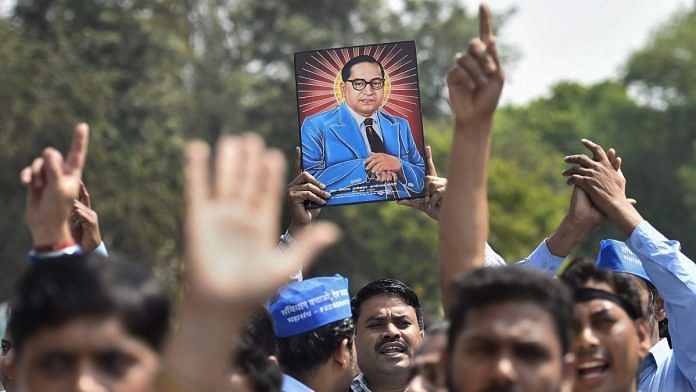The 131st birth anniversary of Babasaheb Dr B.R. Ambedkar was celebrated across political parties and social organisations, cutting caste, class, religion and ideological differences. The actions of these parties and organisations remind us that Ambedkar is increasingly being revered in India, but are his teachings getting similar importance?
This is a pertinent question today as we constantly hear news of minorities being targeted or attacked. Such incidents damage the image of India, and need urgent attention. We need to re-read Ambedkar’s thoughts on minorities and how to handle their issues.
Just putting him on a pedestal and ignoring his teachings won’t help India move forward.
Ambedkar’s idea of minority
Nowadays, the term ‘minority’ has been reduced to mean religious minorities. But Ambedkar’s definition of minorities was not limited to the numerical minority, instead it included communities that had been excluded, suppressed and oppressed. Ambedkar said in his evidence before the Southborough Committee in 1928, “I think we must be very careful in using the word ‘minority’. I do not think simply because a community happens to be a community composed of small numbers it is therefore necessarily a minority for political purposes. A minority which is oppressed, or whose rights are denied or the majority, would be a minority that would be fit for consideration for political purposes”.
Ambedkar argued that the Oppressed Classes/Scheduled Castes were a minority community in the Indian subcontinent because they did not have adequate share in socio-political and economic power. Although Ambedkar had initially defined minorities in terms of power-sharing, he did not completely discard the idea of a numerical minority. The idea of numerical minority started figuring clearly in his writings and speeches during and after the framing of the Indian Constitution. In one of his addresses at Siddharth College on 25 September 1947, he elaborated on the idea of a numerical minority.
Also read: Ambedkar said tyranny of majority is no democracy. Indians must read him again
Against the rule of majority
The rule of majority has been constantly interpreted as a divine law not only in India, but also elsewhere in the world. Ambedkar cautioned against such tendencies. While talking about the idea of ‘parliamentary democracy as a democracy of majority’ in his address at the Siddharth College students’ parliament, Ambedkar said, “It is true that in our legislation there is a rule that all questions shall be decided by a majority. But I could ask you to be very careful about that principle. It is one of the most dangerous principles that we have got. The majority rule has been admitted merely for reasons of convenience [emphasis added]. But for God’s sake, do not ride that principle too much. You will create great deal of difficulties. In a certain sense, the rule of majority is the wrong rule.”
He further argued, “We have to guard the fundamental right of the minorities. Do not forget that fundamental right means that the majority has no right to do a certain thing [emphasis added]…. The fundamental right in a constitution puts absolute limitation upon the power of the majority to do a certain thing. As a matter of fact, the majority rule has come but by what I call a fluke.”
Also read: In Ambedkar’s ‘Proposed Preamble’ to Indian Constitution, there was no ‘equality’ clause
Minorities must be won over, not dictated to
Ambedkar had argued that in a parliamentary democracy, minorities must always be won over, never be dictated to. To do so, he advised leaders to develop the art of public speaking and persuasion. He said, “In an autocracy where the laws are made by the wishes of a dictator or by an absolute monarch, the art of speaking is unnecessary. No autocrat, no absolute monarch need pay any attention to eloquence because his will is law. But in a parliament where laws are made, no doubt by the wishes of the people, the man who succeeds in winning our opposition is the man who possesses the art to persuade his opponent. You cannot win over a majority in this House by giving a black eye to your opponent.”
He added, “A minority is not going to curb a majority by bringing goondas, nor is the majority going to record and obtain a victory by laying low the members of the minority. You will have to carry a proposition only by the art of speaking, by persuading his opponent, by winning him over his side by argument, either gentle or strong, but always logically and instructively.”
Also read: Why Ambedkar changed on separate electorate. His shift was strategic not voluntary
Constitutional morality against social morality
Ambedkar placed special emphasis on the idea of constitutional morality instead of social morality in matters of governance and court judgments. Although his idea of constitutional morality has not been explored adequately, it has acquired great significance in recent years, forcing the Supreme Court of India to investigate its proper meaning. However, one definition of this term is that no community can be forced to adopt things that are against constitutional values such as equality, liberty, and fraternity. Neither can communities go against the Constitution in their treatment of each other.
There is a growing tendency in India to force minorities to adopt the worldviews of the majority. It is completely against the fundamental rights enshrined in our Constitution. The task of guarding the fundamental right of citizens has been given to the Supreme Court under Article 32, the article Ambedkar termed ‘the soul of the Indian Constitution’. Any failure to protect the fundamental rights of minorities means damaging the very soul of the constitution, and of course violating the core teachings of Ambedkar. Political parties bowing to Ambedkar must remember that.
Arvind Kumar (@arvind_kumar__) is doing his PhD in Politics, Department of Politics & IRs, Royal Holloway, University of London. Views are personal.



